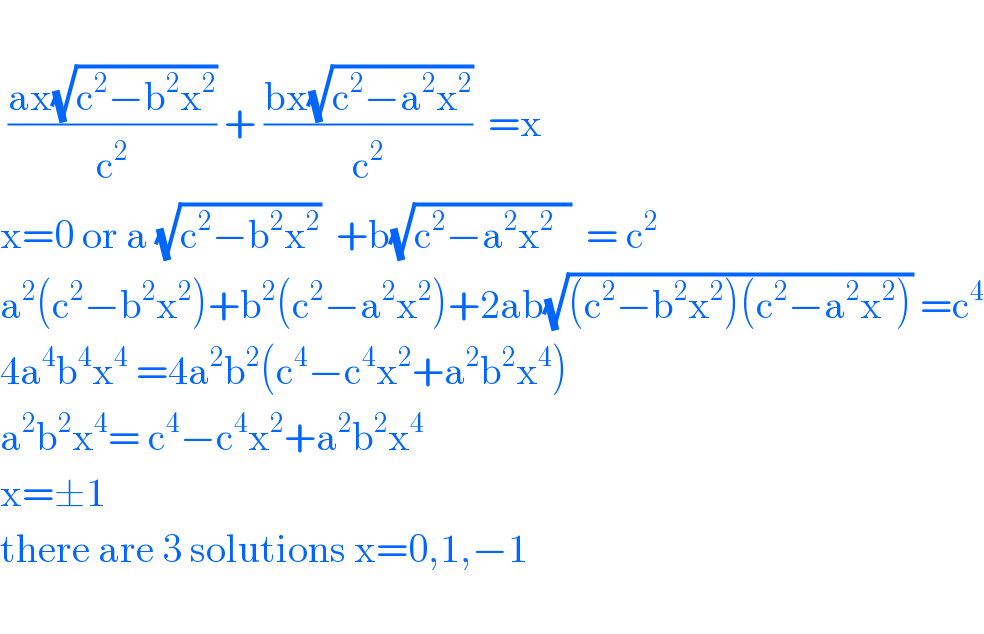Question Number 24098 by Sudipta Jana last updated on 12/Nov/17
![sin^(−1) ((ax)/c)+sin^(−1) ((bx)/c)=sin^(−1) x [When a^2 +b^2 =c^2 ]](https://www.tinkutara.com/question/Q24098.png)
$$\mathrm{sin}^{−\mathrm{1}} \frac{{ax}}{{c}}+\mathrm{sin}^{−\mathrm{1}} \frac{{bx}}{{c}}=\mathrm{sin}^{−\mathrm{1}} {x}\:\:\:\:\:\left[{When}\:\:{a}^{\mathrm{2}} +{b}^{\mathrm{2}} ={c}^{\mathrm{2}} \:\right] \\ $$
Answered by 951172235v last updated on 05/Feb/19

$$ \\ $$$$\:\frac{\mathrm{ax}\sqrt{\mathrm{c}^{\mathrm{2}} −\mathrm{b}^{\mathrm{2}} \mathrm{x}^{\mathrm{2}} }}{\mathrm{c}^{\mathrm{2}} }\:+\:\frac{\mathrm{bx}\sqrt{\mathrm{c}^{\mathrm{2}} −\mathrm{a}^{\mathrm{2}} \mathrm{x}^{\mathrm{2}} }}{\mathrm{c}^{\mathrm{2}} }\:\:=\mathrm{x} \\ $$$$\mathrm{x}=\mathrm{0}\:\mathrm{or}\:\mathrm{a}\:\sqrt{\mathrm{c}^{\mathrm{2}} −\mathrm{b}^{\mathrm{2}} \mathrm{x}^{\mathrm{2}} }\:\:+\mathrm{b}\sqrt{\mathrm{c}^{\mathrm{2}} −\mathrm{a}^{\mathrm{2}} \mathrm{x}^{\mathrm{2}} \:\:}\:\:=\:\mathrm{c}^{\mathrm{2}} \\ $$$$\mathrm{a}^{\mathrm{2}} \left(\mathrm{c}^{\mathrm{2}} −\mathrm{b}^{\mathrm{2}} \mathrm{x}^{\mathrm{2}} \right)+\mathrm{b}^{\mathrm{2}} \left(\mathrm{c}^{\mathrm{2}} −\mathrm{a}^{\mathrm{2}} \mathrm{x}^{\mathrm{2}} \right)+\mathrm{2ab}\sqrt{\left(\mathrm{c}^{\mathrm{2}} −\mathrm{b}^{\mathrm{2}} \mathrm{x}^{\mathrm{2}} \right)\left(\mathrm{c}^{\mathrm{2}} −\mathrm{a}^{\mathrm{2}} \mathrm{x}^{\mathrm{2}} \right)}\:=\mathrm{c}^{\mathrm{4}} \\ $$$$\mathrm{4a}^{\mathrm{4}} \mathrm{b}^{\mathrm{4}} \mathrm{x}^{\mathrm{4}} \:=\mathrm{4a}^{\mathrm{2}} \mathrm{b}^{\mathrm{2}} \left(\mathrm{c}^{\mathrm{4}} −\mathrm{c}^{\mathrm{4}} \mathrm{x}^{\mathrm{2}} +\mathrm{a}^{\mathrm{2}} \mathrm{b}^{\mathrm{2}} \mathrm{x}^{\mathrm{4}} \right) \\ $$$$\mathrm{a}^{\mathrm{2}} \mathrm{b}^{\mathrm{2}} \mathrm{x}^{\mathrm{4}} =\:\mathrm{c}^{\mathrm{4}} −\mathrm{c}^{\mathrm{4}} \mathrm{x}^{\mathrm{2}} +\mathrm{a}^{\mathrm{2}} \mathrm{b}^{\mathrm{2}} \mathrm{x}^{\mathrm{4}} \\ $$$$\mathrm{x}=\pm\mathrm{1} \\ $$$$\mathrm{there}\:\mathrm{are}\:\mathrm{3}\:\mathrm{solutions}\:\mathrm{x}=\mathrm{0},\mathrm{1},−\mathrm{1} \\ $$$$ \\ $$
